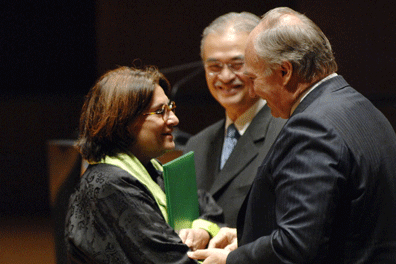
Dr. Selma Al-Radi, the Iraqi project director who restored the Amiriya complex in Rada, Yemen, over a 26 year period, receiving her 2007 Aga Khan Award for Architecture. The winners are being congratulated by Malaysian Prime Minister Badawi and His Highness the Aga Khan. Photo credit: AKDN/Gary Otte
Selma Al-Radi died peacefully at her home in New York City on October 7, 2010. She was 71 and was surrounded by family and friends. Often described as “a force of nature†by many, she was slowly robbed of that energy by her Alzheimer’s affliction, leaving a ruin that was rapidly demolished by ovarian cancer in a little over a year after symptoms were first detected.
Selma was born on 23 July 1939 in Baghdad and grew up in many countries but largely in Iran and India where her father served as the Iraqi Ambassador for a number of years. She graduated from Cambridge University in Archaeology and Ancient Semitic Languages, and earned her Master’s degree at Columbia where she came under the influence of her lifelong mentor, the late Dr. Edith Porada. She obtained her PhD at the University of Amsterdam but remained under the mentorship of Dr. Porada along with Dr. Maurits van Loon. Her thesis work focused on a Neolithic site in Cyprus (Phlamoudhi Vounari).
A consummate “dirt†archaeologist, working mainly on excavations in the field, Selma excavated on sites in most of the Middle East including Iraq, Syria, Turkey, Lebanon, Kuwait, Egypt, and Yemen. But Yemen was where she would spend much of her career. She first started working there in the late 1970s, first as a consultant to the Antiquities Department and was central in establishing the National Museum of Yemen. During that time she stumbled upon the Amiriya Madrasa in Rada’. It was a case of instant love. She immediately decided that this would be her life’s work. The early 15th C palace, school, and mosque complex
includes unique elaborately painted walls and stucco that was falling into ruin. She convinced the Yemeni and Dutch governments to fund first the structural restoration of the building. Over the next 20 odd years, she fought for and got funding for the restoration of the complex in its entirety. Her beloved Yemeni team and she revived many of the original
medieval building methods of the region. She relied on artisans with technological memories that had been handed down from generation to generation. She encouraged their experimentation and in response to her great respect for their work, many Yemenis – imams, politicians, government officials, and the local population – became deeply involved in the project.
The al-Amiriya restoration started in the early 1980s and was completed in 2004. At the triumphant formal opening hundreds of international guests joined Yemenis in celebrating Selma’s great achievement. Yemen’s head of state awarded Selma the Presidential Medal of Culture. In 2007, recognizing this monumental work spanning three decades, Selma received the Aga Khan Award for Architecture.